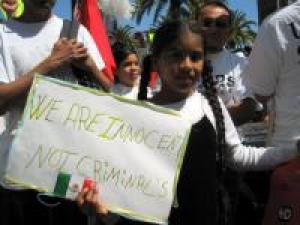
Study Explores Radio as a Mobilization Tool in Latino Communities
The results of a study funded through the Social Science Research Council (SSRC), a grantee of the Ford Foundation, have just been released.
San Francisco State University researcher Graciela Orozco examined how Latinos in California utilized Radio Bilingue, a local Spanish-language radio station, to inform, encourage, and organize political action on the issue of immigrants' rights as part of the national May 1st mobilization protests that took place in 2006. Orozco’s work lends evidence to the continuing importance of broadcast radio for community discourse, outreach and organizing.
On May 1, 2006, nearly two million people marched in towns and cities across the United States to oppose pending federal immigration legislation. These mobilizations are considered to be the largest demonstrations for immigrant rights and the largest Latino mobilizations in U.S. history.
Mainstream media recognized the power of Spanish-language radio in mobilizing Latino families[1], but offered limited information about the participants of those marches.
mobilizing Latino families[1], but offered limited information about the participants of those marches. This study utilized a mixed methods approach that included an analysis of 20 hours of programming followed by in-depth focus groups. Data collection for the first part of the research consisted of approximately 20 hours of public radio programming that took place on and around May 1, 2006. A little over 100 unique calls were made to Radio Bilingüe's national talk show, “Línea Abierta” (Open Line), and various musical programs on April 30 and May 1, 2006. The data analysis followed an inductive process beginning with examining the raw data, noting specific emerging themes, constructing overarching themes, and counting the frequency of those overarching themes.
Table 1: Themes from the Archival Programming| Theme | Total Number of References | Percentage |
| ¡Latinos unidos! | 58/103 | 56% |
| ¡A organizarse! (Let’s get organized!) | 54/103 | 52% |
| ¡Ya basta! (Enough!) | 48/103 | 46.6% |
| What’s happening | 40/103 | 38.8% |
| We contribute to this country | 28/103 | 27% |
The first theme, ¡Latinos Unidos!, appeared as a call for solidarity, a love for family and others, the feeling of “we’re all in this together even though I already have papers.” The second strongest theme, ¡A organizarse! (Let’s get organized!), had to do with people educating and organizing each other about what to do at the marches. The third theme, ¡Ya basta!, (Enough!) came across through comments about discrimination, oppression, exploitation, and victimization. The fourth theme, What’s happening, were calls made to report on how empty the freeways were, how no one was out working in the fields, which stores had closed for the day in support of the marches, how many people were at the rallies, etc. The fifth and last theme, We contribute to this country, reflected callers’ self-esteem, pride, and future impact: “I am somebody and I deserve to be here” and “I’m proud to be making history.”
In the second phase of the study, three focus groups with individuals who had called in to Radio Bilingüe during the marches took place. Fifteen individuals were interviewed in Spanish in Fresno, CA where Radio Bilingüe’s main station is located. Questions included: “What happened on May 1st?” and “Why did you call in to Radio Bilingüe to report on the marches?”
Focus group findings echoed the previously-mentioned five themes. Most importantly, the focus groups shed light on the role of Radio Bilingüe in three important areas: (1) Provides relevant information; (2) Models a method of inquiry by showing listeners how to communicate and how to ask questions; (3) Demonstrates through its work that it stands with its listeners. The quote to the right illustrates these points.
To conclude, the findings illustrate how listeners rallied around Radio Bilingüe to make their voices heard. Radio Bilingüe became an important organizational tool by bringing listeners together in a virtual space where they felt united, empowered to express their values and opinions, and informed by the minute-by-minute information that they themselves were producing. From a broader perspective, this study lends support to the continuing relevance of broadcast radio as one of the most effective community-based organizing tools.
For more information on this study, please contact Graciela Orozco at orozco (at) sfsu (dot) edu.
The research was funded by a small grant from the Social Science Research Council, a nonpartisan institution that has supported scholarly research on key public issues for over 80 years. Dr. Orozco's research was one of the first projects under a new program, Necessary Knowledge for a Democratic Public Sphere. Necessary Knowledge is an innovative funding initiative designed to pair academic researchers with non-profit organizations to work together on a research project related to some aspect of media policy or media change. An independent committee of scholars and public interest leaders awards grants four times per year.
A partnership between the Social Science Research Council, the Center for International Media Action and the McGannon Center for Communications Research at Fordham University, Necessary Knowledge seeks to strengthen connections between media research and media reform in the U.S. and around the world. Necessary Knowledge is funded by the Knowledge, Creativity, and Freedom program of the Ford Foundation. For more information, go to: http://programs.ssrc.org/media and for more information go to: http://mediaresearchhub.ssrc.org/rdb/media-hub.


